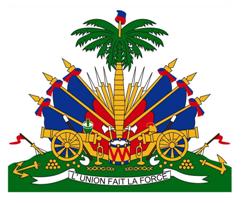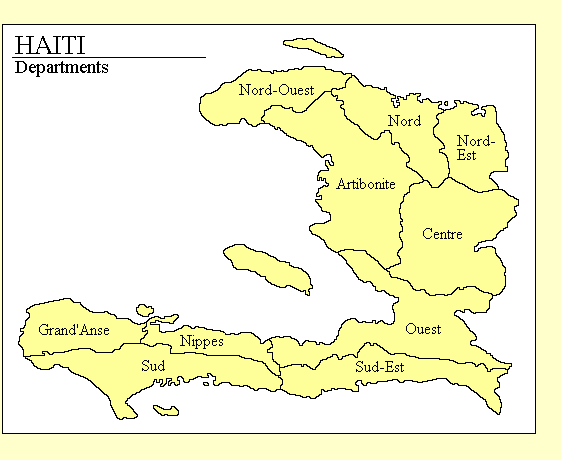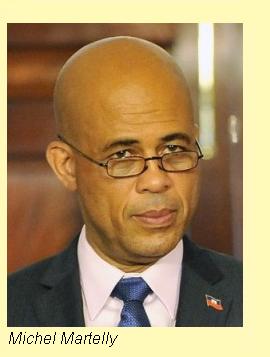

REPUBLIC OF HAITI
• Official name: Republique d'Haiti / Repiblik Dayti (Republic of Haiti)
• Location: Caribbean
• International organisations: African, Caribbean and Pacific Group of States, Organisation of
American States, Organisation Internationale de la Francophonie, United Nations, World Trade Organisation
• Borders: Dominican Republic
• Coastline: Caribbean Sea, North Atlantic Ocean
• Land area: 27,750 Km2
• Population: 9,000,000 (estimate)
• Annual GDP (PPP) per capita: US$1,300 (2009 CIA estimate). World ranking: 170. Haiti is the poorest
country in the Americas.
• Ethnicity: Over 95% of the population are of African descent. There is a small minority
of mulatto (mixed African and European descent) people.
• Languages: French and Haitian Creole are the official languages. Almost the whole
population speaks Creole as its first language.
• Religion: Almost the entire population are officially Christians (Catholic 80%,
Protestant 16%), but the majority also follow the traditional African-derived practices
known as Voudon or Voodoo.
• Form of government: Democratic presidential republic. Haiti is divided into ten departments.
• Capital: Port-au-Prince
• Constitution: The
Constitution
of the Republic of Haiti came into effect in March 1987.

• Head of state: The President, elected by direct universal suffrage for a five-year term.
• Head of government: The Prime Minister, appointed by the President.
• Legislature: has a bicameral legislature, the
National Assembly (Assemblee Nationale).
The Chamber of Deputies (Chambre des Deputes) has 99 members, elected for four-year terms
from single-member constituencies. The Senate (Senat) has 30 members,
elected for six-year terms from the departments.
• Electoral authority: The Provisional Electoral Commission
administers national elections.
• Freedom House 2009 rating: Political Rights 4, Civil Liberties 5
Political history
The island of Hispaniola, of which Haiti occupies the western half, was claimed for
Spain by Columbus in 1492, but in 1697 Spain ceded it to France. French settlers imported
African slaves whose descendants became most of the population. The colony was ruled by a
small minority of Europeans and mulattos. In 1796, stimulated by the ideals of the French
revolution, the slaves revolted, and after prolonged fighting Haiti became an independent
republic in 1804.
Haiti has always been one of the poorest and worst-governed countries in the
Americas. Through the 19th century it was ruled by a series of dictators of varying
degrees of incompetence. The outside world took little notice until 1915, when the
country's unpayable debt led to American occupation. The US introduced a constitution
(written by Franklin D Roosevelt) and other reforms. The occupation ended in 1934.

The Americans left Haiti in the hands of the mulatto minority, but in
1946 Dumarsais Estime became the country's first black president. His efforts a reform sparked
disorders and a coup in 1950, followed by renewed dictatorship. In 1957 Dr Francois Duvalier
("Papa Doc") came to power and established a bizarre personal dictatorship which lasted until his
death in 1971, when he was succeeded by his son Jean-Claude Duvalier ("Baby Doc"). Duvalier junior was
deposed in 1986, leading to a further period of upheaval.
The charismatic black leader Jean-Bertrand Aristide was elected President in 1991, but deposed
in a coup shortly after. This led to a renewed American occupation, and Aristide returned to power in
1994. He was succeeded by Rene Preval in 1996, but returned to office in 2001 after elections widely
regarded as rigged. He ruled in an idiosyncratic and authoritarian manner until February 2004, when he
was again overthrown. An interim government took office until January 2006, when presidential and
congressional elections were held, with Rene Preval returning to office.
Elections scheduled for February 2010 were postponed following the devastating earthquake of
12 January, which destroyed most of Port-au-Prince. They were finally held in two rounds in November 2010 and, after several
delays, March 2011. Preval's chosen successor, Jude Celestin, was eliminated in the first round. In the
second round the singer Michel Martelly defeated
a former first lady, Mirlande Manigat.
Freedom House's 2009
report on Haiti
says: "Haiti is an electoral democracy. In 2006, citizens changed their government in the most credible
elections since 1990... Endemic corruption continues to hobble Haiti's political and economic
development. Haiti was ranked 177 out of 180 countries surveyed in Transparency International's 2008
Corruption Perceptions Index... Freedom of speech and the press has been constrained by the absence
of a viable judicial system and widespread insecurity, but violence against journalists, though
problematic, remained reduced in 2008... The freedoms of assembly and association, including labor rights,
are not respected in practice... The judicial system continues to be corrupt, inefficient, and dysfunctional."
Updated September 2011
|

